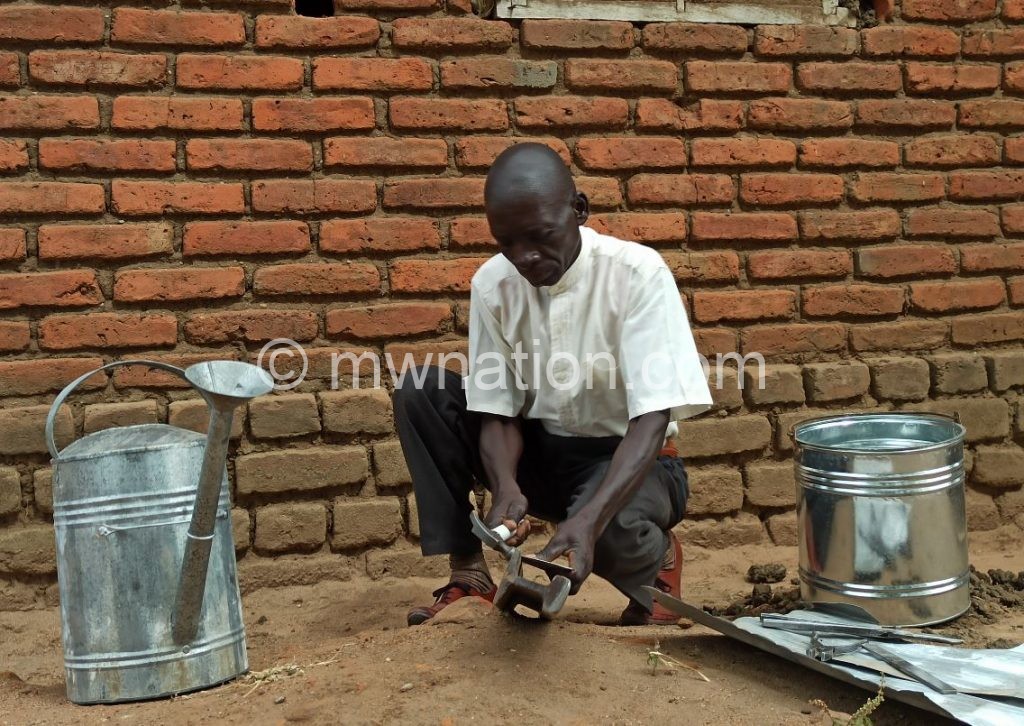Shedding poverty bit by bit
James Kayoyola, 53, is a famous tinsmith in Kachitsa Village, Traditional Authority Kambwiri in Salima. He hammers out watering cans, pots and buckets for sale to sustain his seven children, five grandchildren and an elderly mother.
“Life is not easy, but I have to do anything possible, even casual work, to feed my family,” says the breadwinner.

Kayoyola was stuck in abject poverty until 2015 when he started receiving bimonthly social cash transfer of K14 500 in aid of his sickly mother who no longer works.
The cash-outs were not enough to support his family, but he is reaping dividends having invested part of it in his business.
“I had to step up my game. My business wasn’t doing well and I needed K4 000 for buying sheet metal for making watering cans which I sold at K25 000,” he explains.
In February, Kayoyola joined a village savings and loans group where social cash transfer recipients share business ideas and borrow at low interest.
He calls this the best decision he has made for years.
He borrowed K10 000 from the ‘village bank’ for growing his business and roofing her home with iron sheets.
“To walk free from poverty, we need to join hands and work together towards the change we want,” he says.
Kayoyola’s group is part of Care Malawi’s Tidzidalire Project funded by Financial Access for Rural Markets, Smallholders and Enterprise (Farmse). The three-year initiative seeks to help ultra-poor households to overcome hunger and poverty through improved financial literacy.
Gerald Kossam, district coordinator at Care Malawi, says the target households will receive start-up capital in August to boost their small businesses.
He says: “It’s encouraging that these people are using the cash transfers to do businesses. With this spirit, their future looks promising.
“They have acquired business knowledge, so we believe their businesses will keep growing when they get the capital.”
Dalitso Kachingwe, 43, has been living from hand-to-mouth since her husband died in 2010. The mother-of-three has endured the agony of seeing her children quit school one after another because she could not afford their educational needs. She says there was no joy seeing her children help her cultivate fields of well-off neighbours instead of going to school.
“I was one of the poorest in my community. My children and I wore rags and slept on an empty stomach in a leaky hut. Our little earnings from piecework couldn’t improve our livelihoods,” says Kachingwe, who receives K16 000 every two months.
The woman sells linear thread extracted from old tyres to multiply her cash-outs.
“We conducted a quick assessment and found that there was gold in worn-out tyres. My children and I raised an extra K9 000 as we needed K 25 000 to make the business work,” she explains.”
The family has been using the knowledge acquired through the savings and loans groups supported by Tidzidalire Project to expand the business on the wheels to a brighter future.
Golie Nyirenda, knowledge management and communications officer for Farmse, says the initiative appears on course to achieve its goal of enhancing the resilience of the rural poor.
Brighton Chunga, district community development officer in Salima, says the district along the shoreline of Lake Malawi plays home to 10 000 families currently receiving social cash transfers.
“The beneficiaries are empowered to generate their own income. As community development workers, we believe that if people are trained to save and invest their social cash transfer in profitable businesses, they can liberate themselves from extreme poverty,” he states.
In 2018, the United Nations Children’s fund (Unicef) reported that well-designed social cash transfers have the ability to improve not only the nutrition and economic well-being of the households but also the health and education of children at risk of dropping out due to lack of basic needs.
Kayoyola is happy that his children are still in school in the area where girls often marry young, with the national census showing almost half of women in Malawi marry before their 18th birthday, the legal marriageable age.





